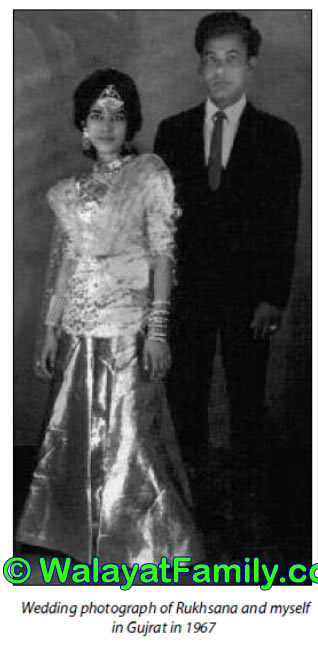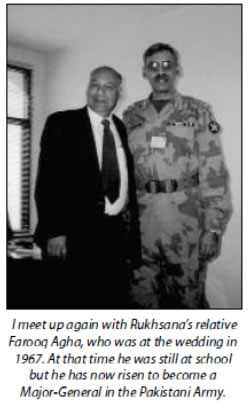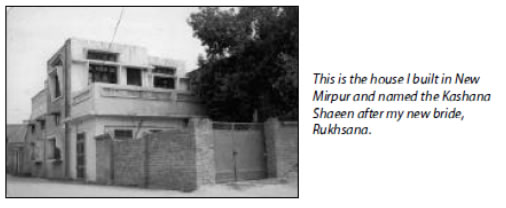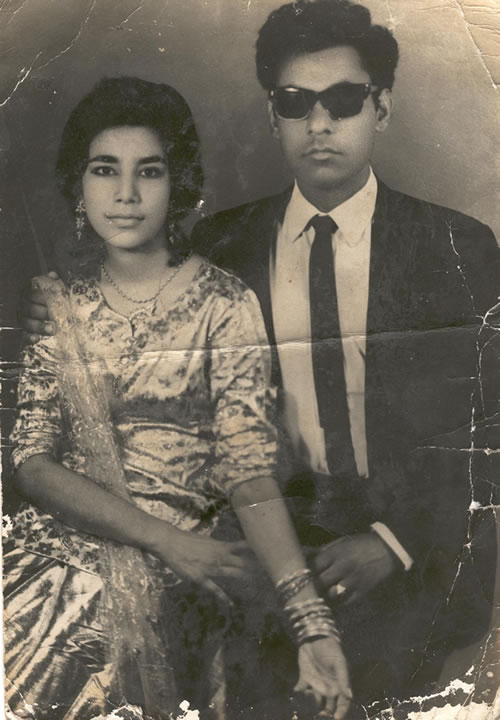News
Made in England: Fortune Smiles Twice - Chapter 6 - Made in England - The Memoirs of Dr Choudry Mohammed Walayat MBE
On returning to Pakistan in 1965 I enjoyed two pieces of extreme good fortune that would change my life forever. One of them enabled me to become a wealthy man for the first time in my life, while the second revealed my wonderful new bride who was to become my lifetime companion. I did not return from England with any saved money. My jobs in Dewsbury and Nottingham had not paid very much and I had only had enough money to live on. Suddenly all that was to change as I took advantage of a once in a lifetime situation as the Mangla Dam neared its completion.
Everywhere in the world when dams are finally flooded, the houses, villages and towns that will be covered by the waters are razed to the ground and the materials removed. That is what happened with the Ladybower project, near Sheffield, when Derwent Village was cleared, although in that case they did leave the church spire sticking above the water for a couple of years. I discovered that the Government was paying compensation to the householders who would lose their houses and land, but if they wanted to keep the building materials it would reduce their compensation by 25%. Many people could not make up their minds what to do and in the meantime they accepted the full 100% compensation on the understanding that they could pay 25% back if they decided later to keep the materials. The Government however was in a hurry to get rid of all the buildings so that the filling of the Dam could begin.
The responsibility for getting this situation resolved on time lay with the Executive Engineer who, out of the blue, decided to offer me an opportunity that could bring me in some money. I went to discuss the possible allotment of a plot on which I could construct my own house, but the Commissioner who was working out the allocation of allotments kept ignoring me. I assumed it was a typical case of an official treating a man from Azad Kashmir with scarcely veiled contempt. I called out to him not to ignore me. He retorted, “If you want to complain, complain to the President”. Quickly I responded, “The President has appointed you to serve us and I am paying your salary through my taxes.” He was embarrassed, and now, realising I was an educated man, he dealt promptly with my case.
More importantly the Executive Engineer had been watching our little altercation and had been impressed by my spirit. He then made me the most amazing offer that, at the time, I thought was because he just thought I had the energy and entrepreneurial skills to succeed and get results. Later, I was to discover there might have been a more personal reason. So, some time later, I visited him and he offered me the chance to buy the materials from as many of the compensated houses as I could manage. He allowed me to pay only 2% rather than the 25% that the owners would have had to pay. I grasped the opportunity I had been given with both hands. I soon worked out that I could sell the materials on for 15–20% and the new buyers would still be benefiting from a better deal than if they paid the Government. Fortunately enough people wanted to buy from me and I financed each new deal with the money from the previous deal. Extraordinarily within a few weeks I had bought up over 1000 properties and had sold on most of the building materials. You got a better price if the house was made of brick rather than mud, but there were always doors, windows and wooden beams that would bring in some money. I had large numbers of properties in several villages as well as in the old city of Mirpur, soon to disappear under the waters of the dam. By the time I had finished, I had two people working for me and I had amassed over half a million rupees, over £60,000, and that was a lot of money in the Sixties in Britain, let alone in Pakistan.
So because of this “window” of opportunity created by the filling of the Mangla Dam and the Executive Engineer’s patronage, I could say goodbye to the poverty that had been the lot of people like me from Asian rural villages for generations, if not centuries. I bought a few material goods, including a motorbike, and started to build a house in the new town of Mirpur, constructed on higher ground above the dam waters. The motorbike not only fitted my image at the time as a something of a fashionable young man – I was particularly proud of my smart white trousers – but was more useful on the tracks and paths that linked the villages. A car would have been very restrictive because there were no proper roads in most of the area.
I was now also in a position to help relatives and some people who had helped me in the past but were not very well off. I was especially pleased to be able to make a loan of 5,000 rupees to the solicitor, Abdul Khaliq Ansawri, who my father had worked for and who had helped me to get into the Intermediate College thirteen years before. I could not help thinking how the tables had turned, allowing me the pleasure of helping this good man who had made such an important intervention in my life back in 1953. I also gave some money to help support a number of schools that were being rebuilt in the Mirpur area where I had grown up. Here, I was repaying a different kind of debt, because these local schools had given me such a good start in life. Perhaps the contribution I gave them similarly helped some other children gain an education that benefited them throughout their lives.
However, I tried to avoid the Engineer, because I assumed he would want his cut from all the money I had made, although there had never been any discussion of any money, or bribe, with him when he made his offer. However, that was the way of officials in Pakistan and I even turned down an invitation to the wedding of one of his daughters, so that I would not see him and be reminded of his generosity and my huge profits. Some time later I bumped into him by chance and he very warmly invited me over to dine with his family. Again there was no hint about any money but I decided I ought to give him something, because without his approval I could never have bought those properties at such a bargain price. I took some gifts for his family when I visited, including a saree for his wife and some expensive chocolates, and just put 10,000 rupees inside the box. When he found it he refused to take it. With a laugh, and I am still not sure if he was joking or not, he said, “I do take bribes but not from you.”
Soon it became clear why I had been blessed with his backing and support. He had two other daughters who were very pretty and dressed in the latest “Teddy” fashion with very tight, white shalwar kameez, in a Pakistani version of the drainpipe trousers worn by “Teddy Boys” in England. He sketched out a future for me running his taxi and petrol stations business in Sindh province after marrying one of his daughters and joining his upper middle class family. In some circumstances this might have been very tempting but I had already made a commitment to Rukhsana, who I had not yet met personally, but who would become my bride in April 1967.
 The Second and Best Piece of Good Fortune
The Second and Best Piece of Good Fortune
While my house was being built in a new part of Mirpur called Sector F1, I lived in quarters in the Mirpur Police Lines with a childhood friend from Mirpur High School who was now a Police Inspector. Next door lived another Police Inspector whose wife was a Headmistress, who it turned out had a sister in Gujrat who was keen to marry off her niece to an eligible young man. I became good friends with the Inspector and his wife, so much so that I began to call her “Auntie”. She must have been impressed with me because she invited me to go to Gujrat where, although I did not know it, I was perhaps being vetted to see if I would make a suitable husband for her niece.
Back home in Mirpur it became apparent what was going on. I was shown a photograph of a beautiful girl and the idea of marriage was put into my head. The girl was seventeen, an age at which middle class girls in Pakistan regularly got married. She was from a different caste and a very religious family, so there was no way I would be allowed to see her, or even speak to her, before the marriage ceremony. I was given more information about her and clearly I was being pressured to make a decision in her favour. The family had decided that I was acceptable to them, even though they were a well-educated, comfortably-off Gujrat family, who normally would not have entertained a man from a poor family in a rural area in Azad Kashmir, who was from a different caste.
 It was a measure of how far I had
come in the last two decades that this
family was prepared to accept me. Many
of them held prestigious professional
positions, including a Major in the
Army, teachers and even a Flight
Lieutenant, who was a pilot in the
Pakistani Air Force. If this was not
enough, the sister ofmy bride-to-be was
also a Lieutenant in the Army, not very
common at that time. To be honest, I
did not realise there were women in the
Army, let alone some who were
commissioned. I must have appeared
well-educated to them, full of social
confidence, could speak good English,
dressed stylishly and, of course, I was
rather well off at that time. The girl’s
name was Rukhsana and all I had
received from her were two very nice
letters, which she had written in Urdu
and sent to me personally. From the letters it was clear that she was a welleducated
young lady, and I was told that she was finishing at Intermediate College
and hoped to be a teacher. It was not much to rely on when making a decision of
such vital importance. No one in the West would have chosen a bride on so little
evidence, but traditionally things were done differently in many Asian countries
and I trusted my new “Auntie” to make a good match for me.
It was a measure of how far I had
come in the last two decades that this
family was prepared to accept me. Many
of them held prestigious professional
positions, including a Major in the
Army, teachers and even a Flight
Lieutenant, who was a pilot in the
Pakistani Air Force. If this was not
enough, the sister ofmy bride-to-be was
also a Lieutenant in the Army, not very
common at that time. To be honest, I
did not realise there were women in the
Army, let alone some who were
commissioned. I must have appeared
well-educated to them, full of social
confidence, could speak good English,
dressed stylishly and, of course, I was
rather well off at that time. The girl’s
name was Rukhsana and all I had
received from her were two very nice
letters, which she had written in Urdu
and sent to me personally. From the letters it was clear that she was a welleducated
young lady, and I was told that she was finishing at Intermediate College
and hoped to be a teacher. It was not much to rely on when making a decision of
such vital importance. No one in the West would have chosen a bride on so little
evidence, but traditionally things were done differently in many Asian countries
and I trusted my new “Auntie” to make a good match for me.
So, I said yes! Soon the marriage ceremony was being planned for April 1967 at my young bride’s house in Gujrat. On the day my own family, who had played no part in the arrangements, came over from Mirpur and joined in the festivities which were organised along traditional lines. They were surprised that I had married out of my caste. This was not unknown among educated people but was not done among the Jats of Mirpur. I was pleased to be the first in my area to have broken this taboo and it was tolerated, although it would have been different if I had been a girl wanting to do the same thing. That would have been unacceptable and would have been strenuously resisted.
 For our “Honeymoon” we stayed in Jhelum where we were given some
private rooms in the Police Inspector’s own house. I could have taken
Rukhsana back to my new house in Mirpur, which I had already named
Kashana Shaeen after her. Shaeen was her middle name and Kashana meant
nest, so at the top of my house it proclaimed “Nest of Shaeen”. But Mirpur was
an unsophisticated place and the area where my house was still looked like a
building site. Rukhsana and I needed some peace and quiet to get to know
each other. She was an innocent young woman but full of love and tenderness
towards me, and it soon became apparent that my “Auntie” and her wider
family had made a very good choice. We got on very well together exploring
our new relationship, but I could not have subjected her to a life in Mirpur,
because she came from a family background that was used to more comfort
and excitement than Mirpur could offer.
For our “Honeymoon” we stayed in Jhelum where we were given some
private rooms in the Police Inspector’s own house. I could have taken
Rukhsana back to my new house in Mirpur, which I had already named
Kashana Shaeen after her. Shaeen was her middle name and Kashana meant
nest, so at the top of my house it proclaimed “Nest of Shaeen”. But Mirpur was
an unsophisticated place and the area where my house was still looked like a
building site. Rukhsana and I needed some peace and quiet to get to know
each other. She was an innocent young woman but full of love and tenderness
towards me, and it soon became apparent that my “Auntie” and her wider
family had made a very good choice. We got on very well together exploring
our new relationship, but I could not have subjected her to a life in Mirpur,
because she came from a family background that was used to more comfort
and excitement than Mirpur could offer.
However Rukhsana saw it differently. She was young and, before she had children, she wanted to see something of the outside world and especially the West, which looked so glamorous and advanced to people who lived in the Punjab in the Sixties. First stop for most Pakistanis visiting the outside world was usually England, which was having its own cultural revival during the “Swinging Sixties” – although I do not think this had penetrated to Darnall at that time.

Who is the “cool dude in the shades”?
A photograph of my beautiful new bride andmyself during our honeymoon in Jhelum
By Dr. Choudry M. Walayat MBE
Copyright 2009 - Dr. Choudry M. Walayat MBE
You May contact Choudry Walayat on his Mobile - 07941016417 (UK)
-------------------------------------------------------------------------------------
All rights reserved. No part of this online book may be reproduced, stored in a retrieval system or transmitted in any form or by any means, electronic or mechanised, by photocopying, recording or otherwise without the prior written consent.
Online Copy Published by Nadeem Walayat - Contact admin@REMOVEwalayatfamily.com
Hard Copy Published by Kashaf Walayat - ISBN Number 978-0-9560445-0-1 - Contact on Mob. No. 0044 7766 22 1006
All facts and opinions in this book are the sole responsibility of Dr. Choudry M. Walayat. The book has been written in co-operation with John Cornwell, who produced the final texts of the chapters of the book.
